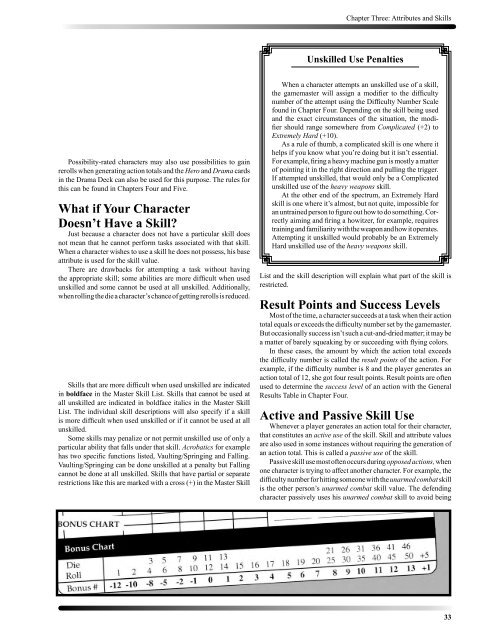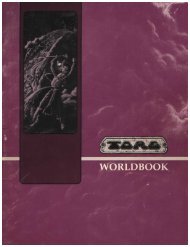Torg Player Rules
Torg Player Rules
Torg Player Rules
Create successful ePaper yourself
Turn your PDF publications into a flip-book with our unique Google optimized e-Paper software.
Possibility-rated characters may also use possibilities to gain<br />
rerolls when generating action totals and the Hero and Drama cards<br />
in the Drama Deck can also be used for this purpose. The rules for<br />
this can be found in Chapters Four and Five.<br />
What if Your Character<br />
Doesn’t Have a Skill?<br />
Just because a character does not have a particular skill does<br />
not mean that he cannot perform tasks associated with that skill.<br />
When a character wishes to use a skill he does not possess, his base<br />
attribute is used for the skill value.<br />
There are drawbacks for attempting a task without having<br />
the appropriate skill; some abilities are more difficult when used<br />
unskilled and some cannot be used at all unskilled. Additionally,<br />
when rolling the die a character’s chance of getting rerolls is reduced.<br />
<br />
<br />
<br />
<br />
<br />
<br />
<br />
<br />
Skills that are more difficult when used unskilled are indicated<br />
in boldface in the Master Skill List. Skills that cannot be used at<br />
all unskilled are indicated in boldface italics in the Master Skill<br />
List. The individual skill descriptions will also specify if a skill<br />
is more difficult when used unskilled or if it cannot be used at all<br />
unskilled.<br />
Some skills may penalize or not permit unskilled use of only a<br />
particular ability that falls under that skill. Acrobatics for example<br />
has two specific functions listed, Vaulting/Springing and Falling.<br />
Vaulting/Springing can be done unskilled at a penalty but Falling<br />
cannot be done at all unskilled. Skills that have partial or separate<br />
restrictions like this are marked with a cross (+) in the Master Skill<br />
Chapter Three: Attributes and Skills<br />
Unskilled Use Penalties<br />
When a character attempts an unskilled use of a skill,<br />
the gamemaster will assign a modifier to the difficulty<br />
number of the attempt using the Difficulty Number Scale<br />
found in Chapter Four. Depending on the skill being used<br />
and the exact circumstances of the situation, the modifier<br />
should range somewhere from Complicated (+2) to<br />
Extremely Hard (+10).<br />
As a rule of thumb, a complicated skill is one where it<br />
helps if you know what you’re doing but it isn’t essential.<br />
For example, firing a heavy machine gun is mostly a matter<br />
of pointing it in the right direction and pulling the trigger.<br />
If attempted unskilled, that would only be a Complicated<br />
unskilled use of the heavy weapons skill.<br />
At the other end of the spectrum, an Extremely Hard<br />
skill is one where it’s almost, but not quite, impossible for<br />
an untrained person to figure out how to do something. Correctly<br />
aiming and firing a howitzer, for example, requires<br />
training and familiarity with the weapon and how it operates.<br />
Attempting it unskilled would probably be an Extremely<br />
Hard unskilled use of the heavy weapons skill.<br />
List and the skill description will explain what part of the skill is<br />
restricted.<br />
Result Points and Success Levels<br />
Most of the time, a character succeeds at a task when their action<br />
total equals or exceeds the difficulty number set by the gamemaster.<br />
But occasionally success isn’t such a cut-and-dried matter; it may be<br />
a matter of barely squeaking by or succeeding with flying colors.<br />
In these cases, the amount by which the action total exceeds<br />
the difficulty number is called the result points of the action. For<br />
example, if the difficulty number is 8 and the player generates an<br />
action total of 12, she got four result points. Result points are often<br />
used to determine the success level of an action with the General<br />
Results Table in Chapter Four.<br />
Active and Passive Skill Use<br />
Whenever a player generates an action total for their character,<br />
that constitutes an active use of the skill. Skill and attribute values<br />
are also used in some instances without requiring the generation of<br />
an action total. This is called a passive use of the skill.<br />
Passive skill use most often occurs during opposed actions, when<br />
one character is trying to affect another character. For example, the<br />
difficulty number for hitting someone with the unarmed combat skill<br />
is the other person’s unarmed combat skill value. The defending<br />
character passively uses his unarmed combat skill to avoid being<br />
33



